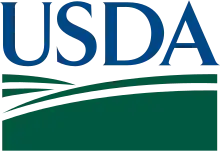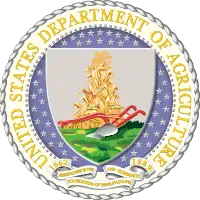Agricultural Marketing Service
The Agricultural Marketing Service (AMS) is an agency within the United States Department of Agriculture, and has programs in five commodity areas:[1] cotton and tobacco; dairy; fruit and vegetable; livestock and seed; and poultry. These programs provide testing, standardization, grading and market news services for those commodities, and oversee marketing agreements and orders, administer research and promotion programs, and purchase commodities for federal food programs. The AMS enforces certain federal laws such as the Perishable Agricultural Commodities Act and the Federal Seed Act.[1] The AMS budget is $1.2 billion.[2] It is headquartered in the Jamie L. Whitten Building in Washington, D.C.
The current Administrator as of February 3, 2021 is Bruce Summers.[3]
Programs
The AMS National Organic Program (NOP) develops, implements, and administers national production, handling, and labeling standards for organic agricultural products. The NOP also accredits the certifying agents (foreign and domestic) who inspect organic production and handling operations to certify that they meet USDA standards.

The AMS Science and Technology Program provides scientific support services to the agricultural community and AMS programs, including laboratory analyses, laboratory quality assurance, and coordination of scientific research conducted by other agencies for AMS. In addition, the program's Plant Variety Protection Office administers the Plant Variety Protection Act, by issuing Certificates of Protection for new varieties of plants which are sexually reproduced (by seed) or tuber-propagated. The program also conducts a program to collect and analyze data about pesticide residue levels in agricultural commodities. It also administers the Pesticide Recordkeeping program, which requires all certified private applicators of federally restricted-use pesticide to maintain records of all applications. The records will be put into a data base to help analyze agricultural pesticide use.[4]
The AMS Transportation and Marketing Program supplies research and technical information regarding the nation's food transportation system to producers, producer groups, shippers, exporters, rural communities, carriers, government agencies and universities. The program also administers a program involving financial grants to States for marketing improvements. In addition, the division assists in the planning and design of marketing facilities, processes, and methods in cooperation with state and local governments, universities, farmer groups, and other segments of the U.S. food industry. This program is intended to enhance the overall effectiveness of the food marketing system, provide better quality products to the consumer at reasonable cost, improve market access for growers with farms of small to medium size, and promote regional economic development.[5] [6]
The AMS administers the commodity checkoff programs.[2]
References
- "About AMS". Agricultural Marketing Service. 2013-01-31. Retrieved 2013-06-13.
- "CATO HANDBOOK FOR POLICYMAKERS, 8TH EDITION (2017)". Cato Institute. Retrieved 12 October 2017.
- "Administrator Anne L. Alonzo". Agricultural Marketing Service. 2013-05-14. Archived from the original on 2014-09-03. Retrieved 2013-06-13.
- "Agricultural Marketing Service (AMS) Overview". USDA. 2011-11-07. Archived from the original on 2016-03-04. Retrieved 2013-06-13.
- "Agricultural Marketing Service". International Trade Data System. Archived from the original on 2013-02-15. Retrieved 2013-06-13.
- "Agricultural Grain Marketing Services". farmnetservices.com. Retrieved 2013-06-13.


